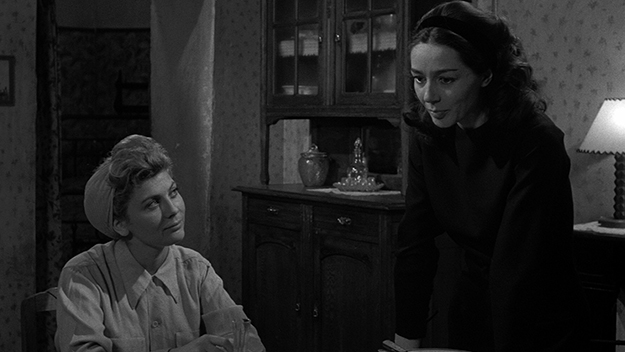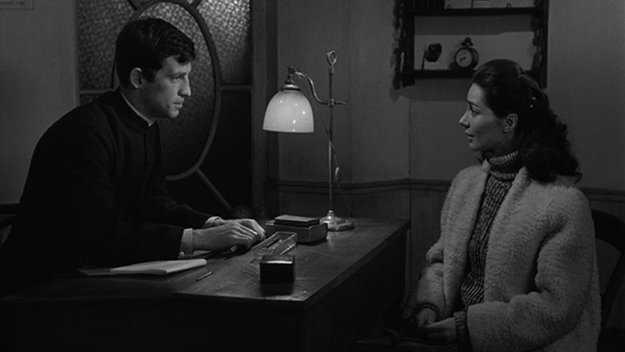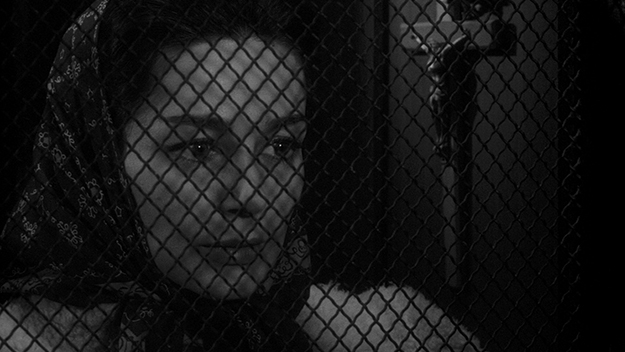The title may be Leon Morin, Priest, but Emmanuelle Riva is the heart and soul of Jean-Pierre Melville’s potent World War II film about political oppression, religious conversion, and romantic frustration. Riva’s portrait of a Communist office worker and single mother striving to maintain her own integrity and her daughter’s safety provides the film with a startling cumulative force. In this 1961 production, two years after she supplied the emotional ballast for Alain Resnais’s Hiroshima, Mon Amour, Riva delivers a great unpretentious performance in a part that could have turned affected or bathetic. With a range of modes from mischievous farce to erotic tragedy, she makes the heroine’s confusion of spiritual and sexual awakening accessible and stirring. Of course, Melville does hand Riva the ideal leading man. Jean-Paul Belmondo, in the first flush of his post-Breathless stardom, imbues the role of the priest with a rugged sensual aura and lightning big-cat reflexes. He’s magnetic both for us and for the female population of a small Alpine town in Occupied France. Morin doesn’t enter the movie until 15 minutes in, and his virtuoso performance varies mostly in intensity. Belmondo is masterly at embodying how Morin uses his charisma, his surly, forthright charm, and his delight in religious argument to revive the faith or at least the curiosity of Catholic women, even outright sinners. He acts with bracing economy when he does something as simple as tug a flirt’s skirt down below her knee. The movie reaches its peak of sexual melodrama when he smashes a hatchet into a stump. It’s both a startling expression of his masculine might and an absolute statement of his determination to be abstinent. Nonetheless, it’s Riva’s emotional vitality that powers the story, suffuses it with an oscillating vibrancy, and inspires Melville’s most inventive, fluid moviemaking. She’s incomparable at conveying fleeting nuances as well as deeper joys and sorrows by controlling the wattage of her eyes and the trembling of her mouth and chin. This accumulation of small expressive touches is as exact and suggestive as a pointillist masterpiece. In Melville’s lucid adaptation of Béatrix Beck’s autobiographical novel (from 1952), Riva plays Barny, the lapsed-Catholic widow of a Jewish husband and the mother of a young girl named France. They’ve relocated from Paris for Barny’s job: grading papers for a French course at the headquarters of a correspondence school. Barny, not Morin, is the film’s unpredictable protagonist, right from the beginning, when she merrily acknowledges, in past-tense voiceover, that she mistook the invading Italian Army for “traveling players” with their silly, flowered felt hats. She tells us that she bore the Occupation lightly. The brilliance in the movie comes from Melville and Riva depicting the psychic cost of Barny’s struggle for romantic and religious transcendence and the escalating weight of life during wartime.
We can easily understand why Barny views her provincial town as a haven from the war, which appears to be happening far away. But when the Italians and then the Germans swarm in, it becomes one more front line in the Occupation. As the Germans take control from the Italians, the change affects everything in Barny’s life, including her crush on a Jewish office manager, Sabine Levy (Nicole Mirel). Barny admires Sabine’s aura of command, but when Sabine ages and wilts under Nazi domination (her brother falls victim to a roundup), Barny’s infatuation fades away. This film is alive to the vagaries of personal attraction and to the power shifts in relationships as well as politics. A collaborationist coworker, Christine (Irène Tunc), spouts fascist cant and anti-Semitism and even threatens to have Barny’s child deported. But after Barny slaps her, hard, Christine becomes her biggest fan. (Christine is also one of Morin’s acolytes.) Riva’s wonderment at her violence and the pain she inflicts on her own hand are prize pieces of slapstick and behavioral comedy. Never belaboring points, the movie captures a woman who walks on an existential tightrope. Barny’s energy goes mostly toward shielding her daughter, which, figuratively as well as literally, is one way to save “France.” After the Germans march into town, Barny prepares France for baptism with two other at-risk kids who have a Jewish or Communist parent. (The other women’s partisan husbands come in from the woods to a rural church for the service.) Melville keeps dissolving to the same setup of Barny sitting at a corner of a kitchen table as she and the other mothers try to spruce up their children and get them to behave. Riva is superb at embodying fatigue and exasperation. The more exhausted Barny gets, the funnier she looks as the kids whirl around and under the table. It’s the sunniest interlude in the movie, and a prime example of Melville’s creative response to an engaged performer. Shortly afterward, Barny invades Morin’s confessional as a joke—she wants to confront a priest for “living off false currency”—then succumbs to his blazing devotion and his nimble proletarian wit. She proclaims religion to be (what else?) “the opiate of the masses” before he goes on the offensive against the luxury and complacency of the Roman Catholic Church. He questions her so seriously and incisively in the confessional that she feels as if she’s examining her adult life for the first time. Without knowing exactly why, she’s hooked. At first, she can’t acknowledge the shared chemistry that’s plain for all to see. What makes their encounter so profound is that she responds deeply when he tests her convictions and thrashes out ideas. Melville shoots the first confessional scene with a silken intimacy (the peerless Henri Decae did the cinematography). In a superbly subtle and instinctive move, the camera enters the old wooden booth after Barny does. It sweeps away the black curtain and moves into a close-up of her expectant face as she nervously raises her hand to her mouth. When Melville cuts to Morin’s fingers suddenly removing the panels and revealing his face, we gasp along with Barny. The confessional brings the actors very near to each other; the wire grid that divides them disappears entirely when Melville shoots them side by side. Later, when Barny visits Morin’s Spartan rooms at night, for counsel and instruction, the camera follows her gaze as she scans his torso and studies his rough, makeshift cassock. The movie is consistently unsettling. Melville exploits the associations Riva carries with her from Hiroshima, Mon Amour, where she played a woman haunted by the traumas that stemmed from her love for a German soldier. In Melville’s film, Morin himself makes Riva’s character suffer. He cruelly forces Barny to confess—formally, in his confessional—that she tried to seduce him. But we recognize that Morin is the one who brought love into the picture from the beginning. “Your comparison between belief in God and love doesn’t make sense,” Barny complains, early on. “We love without proof, but it’s thanks to love that we know this person exists.” The movie takes Barny’s proclamation a step further. At the height of her obsession, Barny’s love for Morin is what makes her believe that she exists.
Film Forum’s centennial Melville celebration has enabled audiences to see how much terrific work this ultra-masculine director pulls off with female performers in close quarters. Melville is best known for the fabulous hard-guy iconography of films like Bob le Flambeur, Le Doulos, and Le Samourai and for blending granular detail and Homeric breadth in underground extravaganzas like Le Cercle Rouge and the Resistance epic Army of Shadows. Recent appreciations have focused on his tributes to crime-world professionals and the tough feelings that bind his gesture-laden style. But Melville also displays his distinctive surgical keenness in chamber dramas and “women’s pictures.” When Barny engages in a stare-down contest from across the office with Sabine, or when Sabine leans over to check a paper and brushes her breasts against the back of Barny’s head, we feel the same frisson we get watching Nicole Stéphane and Edouard Dermit play dangerous games as destructively symbiotic siblings in Les Enfants Terribles, Melville’s second feature. It’s now clearer than ever that Melville deserves as much credit as Jean Cocteau, the co-writer and original author, for that protean, indelible movie. I don’t think Cocteau was being hyperbolic when he said, “Were I to write the book now, I would be influenced by the characters the actors have created.” It’s equally exhilarating to see Melville’s first film, based on Jean Bruller’s novella Le Silence de la Mer, about the determination of an aging Frenchman and his adult niece to resist saying anything to the cultured, Francophile German officer who is billeted in their home. In Enfants, Stéphane is innately, extravagantly theatrical (Cocteau said her “smallest gesture . . . has the frightening power of those of Electra.”) In Silence, as the niece, she must suggest a churning intelligence and vast emotional life underneath her character’s impassive surface. We can’t tell just how miraculously she succeeds until the wrenching, climactic moment when she utters a single word. Riva’s performance ranks with Stéphane’s: her infinite variety makes Barny’s fixation on Morin feel tragic. Morin’s sexual energy rouses her intellect, her passion, and her yearning to fulfill herself, but it blinds her to his adolescent egoism. (It makes sense when Morin says he entered junior seminary when he was 12.) It’s harrowing to see this brave woman isolated and unmoored, struggling to steady herself against a wall while Morin remains strong and implacable at the top of the stairs. In his adaptations of Bruller, Cocteau, and Beck, Melville achieves what his hero, John Huston, does in his renderings of McCullers (Reflections in a Golden Eye) and Joyce (The Dead): he instinctively uses cinematic and dramatic means to take us into literary sensibilities. Melville’s images are cathartic because his vision is both pitiless and tender.
Michael Sragow is a contributing editor to Film Comment and writes its Deep Focus column. He is a member of the National Society of Film Critics and the Los Angeles Film Critics Association. He also curates “The Moviegoer” at the Library of America website.


